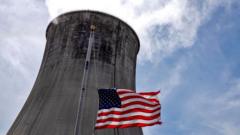In the wake of the catastrophic earthquakes in Turkey, Google has acknowledged that its early warning system severely underperformed, with millions missing critical alerts just before disaster struck. This has ignited discussions regarding the reliability of technology in emergency situations.
Google's Earthquake Alert System Fails During Turkey Crisis

Google's Earthquake Alert System Fails During Turkey Crisis
Despite the presence of its earthquake early warning system, Google did not adequately alert millions during the devastating Turkey earthquakes in 2023, raising concerns about its reliability.
Google has faced scrutiny after its earthquake early warning system failed to properly alert users during the catastrophic earthquakes in Turkey in February 2023. Of the ten million individuals living within 98 miles of the 7.8 magnitude quake's epicenter, the system only sent 469 of the highest-level "Take Action" notifications that could have provided up to a 35-second warning for safety. Instead, around 500,000 users received a lower-level warning meant for minor shaking, which did not notify users in a prominent manner.
Initially, Google reported that the system functioned effectively, but it later revealed that it had grossly underestimated the tremors, predicting magnitudes between 4.5 and 4.9 when the quake was actually a devastating 7.8. Following two major quakes that killed over 55,000 people and injured over 100,000, Google stated that it is continuously refining its system based on past events.
The Android Earthquake Alerts (AEA) system operates by detecting shaking through numerous Android devices, which dominate the Turkish smartphone market. The critical "Take Action" alerts, designed to override do-not-disturb settings, were especially necessary given the first quake struck at 04:17, when many were asleep.
Investigations following the disaster found no one who had received the serious alerts prior to the quake, raising concerns about the system's performance. Experts have criticized the lengthy delay in understanding its limitations, indicating that the technology needs rigorous testing before being fully relied upon by national systems. Google has since updated its algorithms, successfully simulating the first quake and generating millions of additional alerts to those at risk.
Research by Google on the subject highlighted the common challenges faced by earthquake warning systems in calibrating for significant seismic events. Critics like Harold Tobin, Director of the Pacific Northwest Seismic Network, emphasize the importance of transparency in how effectively these systems work, especially in life-threatening situations.
Google stated that, while it aims to enhance its capabilities, the AEA should not replace established national warning systems. However, as the reliance on technology grows, many experts express concerns about how much faith countries place in an untested system.















